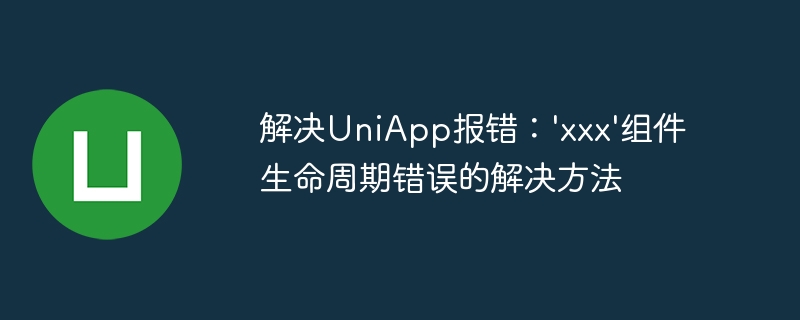
Solution to UniApp error: 'xxx' component life cycle error solution
Abstract: During the development process of UniApp, we sometimes encounter component life cycle errors Error reporting, this article will introduce some common solutions to help developers troubleshoot and solve such problems.
Introduction:
UniApp is a cross-platform application development framework developed based on Vue.js. It can write code at one time and then generate corresponding iOS, Android, H5 and other platforms through the compiler. application. However, during the development process, we sometimes encounter some errors, especially component life cycle errors. These errors will affect the normal operation of the application, so we need to resolve them promptly.
- Check the component name
First check whether the component name reported in the error is correct, and ensure that the component name in template, script and style has the same case. During the development process, sometimes we collaborate with colleagues or other developers to develop, and there may be cases where different people name the same component with inconsistent capitalization. In this case, an error will be reported. Therefore, be sure to double-check the naming of your components to make sure they are correct.
- Check component import
If the component name is correct, then you need to check whether the component is imported correctly. Before using a component, we need to introduce it into the page or other components. This process may also go wrong. If there is an error when importing the component, an error will be reported when using the component. So, double-check your component's import statements to make sure the paths and file names are correct.
- Check component life cycle methods
In UniApp, each component has its own specific life cycle methods, such as created, mounted, updated, etc. If we use the wrong life cycle method in the component, an error will also be reported. When solving this type of error, we need to carefully review the error message and check the component code based on the error message to ensure that the life cycle method is used correctly.
- Check component parameter passing
Parameter passing between components is also an error-prone place. In UniApp, we can pass parameters to subcomponents through props attributes. However, if we pass the wrong parameter name or the parameter type does not match when passing parameters in the parent component, an error will also be reported. At this time, we need to check whether the parameters passed between the parent component and the child component are correct and ensure that the names and types of the parameters are consistent.
- Check component references
In UniApp, we can reference components in pages or other components. If we write the wrong component name when referencing the component, an error will also be reported. Therefore, we need to check the component's reference statement to ensure that the referenced component name is correct.
Conclusion:
In the UniApp development process, component life cycle errors are a common mistake. In order to avoid such errors, we should carefully check the name of the component, the import of the component, the use of component life cycle methods, component parameter passing and component references. Only by ensuring that these aspects are correct can we successfully resolve component lifecycle errors.
Through the above solutions, we can better troubleshoot and solve the problem of UniApp error: 'xxx' component life cycle error. I hope this article can help developers quickly solve such problems when they encounter such problems during UniApp development.
The above is the detailed content of Solution to UniApp error: 'xxx' component life cycle error. For more information, please follow other related articles on the PHP Chinese website!






